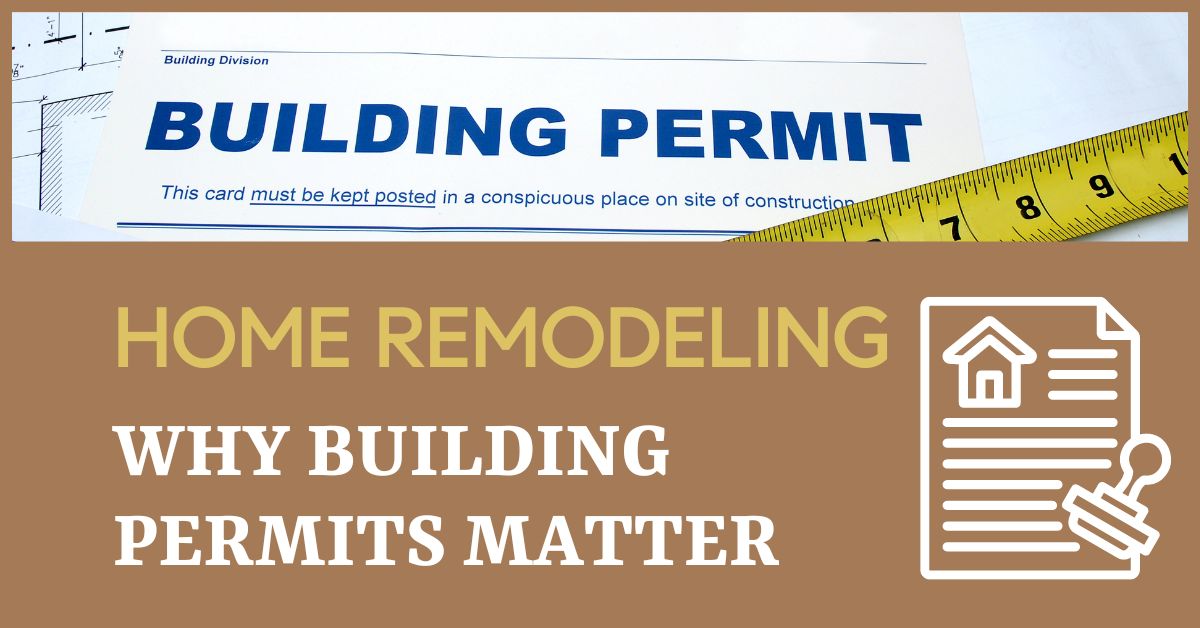Introduction
Remodeling or adding square footage to your home can be an exciting endeavor, promising to enhance your living space and potentially increase your property’s value. However, amid the enthusiasm for your home improvement project, it’s crucial not to overlook a critical aspect: building permits. In this article I delve into the importance of permits for homeowners considering property updates, exploring the reasons for obtaining permits and the key considerations in the permitting process.
Benefit of Obtaining Permits
The first question many homeowners ponder is whether they truly need permits for their remodeling or expansion projects. The answer, in most cases, is a resounding yes. Obtaining permits isn’t just a bureaucratic formality; it’s a legal requirement in many jurisdictions.
Building codes are established to ensure safety, structural integrity, and compliance with zoning regulations. By obtaining permits, homeowners demonstrate their commitment to adhering to these standards, safeguarding their investment and the well-being of their household.
Beyond legal obligations, obtaining permits is essential for several reasons. First, it ensures compliance with building codes, which are updated periodically to reflect advancements in construction practices and safety standards. By adhering to these codes, homeowners can mitigate risks and liabilities associated with substandard construction practices.
Second, obtaining permits provides legal protection. In the event of property damage, personal injury, or disputes with neighbors, having permits in place serves as tangible evidence that the remodeling or expansion was conducted in accordance with established regulations. This can help shield homeowners from potential lawsuits and liability claims.
Moreover, obtaining permits can have implications for insurance coverage. Insurance companies may require proof of permits for home improvement projects, particularly those involving structural alterations or square footage additions. Failing to obtain permits could jeopardize insurance coverage, leaving homeowners vulnerable in the event of accidents or damages.
Finally, permits can positively impact resale value. Prospective buyers are increasingly vigilant about the legality and quality of home improvements. Properties with properly permitted renovations often command higher prices and attract more discerning buyers who value transparency and compliance.
Also, buyers who are financing their purchase will be depending on a home appraisal to justify their purchase price. Non-permitted additions will not be taken into consideration by appraisers, potentially reducing the amount of financing available. This can force buyers to increase their down payment to cover the difference between the offer price and the appraised value. This may reduce the number of purchase offers and thus the final selling price.
Permits for Every Project?
While there are many projects where I would strong advise you apply for permits, there may be cases where the cost and effort aren’t worth it. Small home updates that aren’t dealing with structural elements can often be performed by a homeowner or a handy ma’am. Replacing kitchen cabinets or countertops, updating flooring, or installing new fixtures probably don’t warrant the effort to obtain permits.
However, any time you are contemplating any change to the footprint of your home by adding square footage, you should definitely have the work permitted to ensure you’ll receive credit from an appraiser for the addition when you go to sell your home.
Considerations in the Permitting Process
While obtaining permits is essential, navigating the permitting process can be daunting for homeowners. Here are some key considerations to keep in mind:
- Research Local Building Codes and Regulations: Before starting your remodeling or expansion project, familiarize yourself with local building codes and zoning regulations. Each jurisdiction may have its own requirements and restrictions governing construction projects, so it’s crucial to understand the rules applicable to your area. Fortunately most cities now offer online permitting systems to make it easier to research and apply for permits. The City of Berkeley Permit Center and the City of Oakland Permit Center are two good local examples.
- Understand Permitting Costs and Fees: Permitting fees vary depending on the scope and complexity of the project, as well as local regulations. Budgeting for these costs upfront can help avoid surprises and delays during the permitting process.
- Submitting a Complete and Accurate Application: When applying for permits, ensure that your application is complete and accurate. Provide detailed plans, specifications, and other required documentation to expedite the approval process and minimize the risk of rejection or delays.
- Timelines and Approval Process: Be aware of the timelines and approval process for permits in your jurisdiction. Some projects may require multiple rounds of review and approval, so it’s essential to factor in sufficient time for the permitting process when planning your project timeline.
- Inspections and Compliance Checks: Once permits are obtained, be prepared for inspections and compliance checks throughout the construction process. Building inspectors will verify that the work is being carried out according to approved plans and specifications, so ensure that your contractor is aware of these requirements.
- Potential Challenges and Appeals Process: In some cases, permit applications may be denied or subject to conditions that pose challenges for homeowners. Familiarize yourself with the appeals process and options for resolving disputes or addressing objections raised by regulatory authorities.
- Qualified Vendors: In many cases the vendors you work with for your home renovation will take responsibility for the permitting process. In most cases they will charge a modest administrative fee, but it is almost always worth the cost to avoid the hassle and risk of non-compliance. As part of evaluating vendors ask about their permitting process. If you need recommendations on qualified vendors for you home renovation project, just let me know.
Conclusion
Obtaining permits is a crucial step for homeowners considering remodeling or adding square footage to their homes. Beyond meeting legal requirements, permits offer numerous benefits, including ensuring compliance with building codes, providing legal protection, enhancing resale value, and facilitating future inspections and maintenance. While navigating the permitting process may pose challenges, thorough research, careful planning, and adherence to regulatory requirements can help homeowners successfully navigate this critical aspect of home improvement projects.




